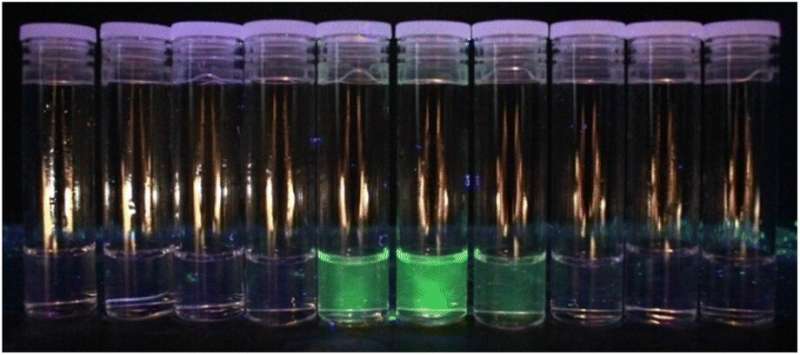This article has been reviewed according to Science X's editorial process and policies. Editors have highlighted the following attributes while ensuring the content's credibility:
fact-checked
trusted source
proofread
New method of recycling colored plastics offers possible solution to 'huge environmental challenge'

A new method for recycling colored plastics has been developed by scientists at Cardiff University.
The process, which breaks down colored polymers, the principal component of plastics, into their original components, could lead to a circular plastic recycling economy reducing pollution on land and in our oceans, the researchers claim.
Widely used in drinks bottles, food packaging, clothing and electronics, colored plastics can be melted down and remolded into new products, but additives or colorants cannot be removed in current recycling processes.
To avoid this method of downcycling, where recycled plastic is of lower quality than the original material, the Cardiff team used a chemical process called depolymerization.
Dr. Ben Ward, Senior Lecturer in Inorganic Chemistry at Cardiff University, said, "Our current recycling economy only allows plastics and polymers to be recycled a finite number of times, after which they go to landfill or are incinerated. This is a huge environmental challenge."
"It is also a problem for industry who want to reuse and recycle colored polymers but are limited by additives which affect the quality and color of recycled products."
"We've addressed this in our study by taking colored polymers, unmaking them, isolating the monomers, and re-making them into pure, white polymers. This is the first time that has ever been achieved and it goes right to the heart of tackling the problem of plastic recycling."
Using a reactor based in the labs at Cardiff University's School of Chemistry, the team chose specific molecules known as monomers to make plastics that are strong and stable, while adding in recyclability as part of the molecular design process.
Further monomers were added to the reactor to give the plastics color while maintaining the same properties as the base materials.
Through a chemical process called depolymerization, the team were able to unmake their products returning them to the original monomers.
They found that the colors could be removed during the depolymerization process, making the plastics recyclable and more sustainable.
Dr. Ward added, "What we're showing is that this is a mechanism by which you can recycle plastics infinitely and that technology just doesn't exist for traditional plastics."
"While industry doesn't currently have the infrastructure to use our approach to plastics recycling, we're showing chemical viability, laying the baseline from which this can be done in the future."
The team is currently working to refine the process further and make it more cost-effective, as well as ensuring that these new polymers can be processed for use in real-world products.
The paper is published in the journal Polymer Chemistry.
More information: Taylor B. Young et al, Chemically recyclable fluorescent polyesters via the ring-opening copolymerization of epoxides and anhydrides, Polymer Chemistry (2023). DOI: 10.1039/D3PY00209H
Provided by Cardiff University




















